Whether it’s a squeaky plush toy or a tough rubber ball, many dogs find irresistible the urge to not just play with, but sometimes destroy and eat their toys. This might seem like harmless fun, but it can lead to serious problems. Toy pieces can causechoking or dangerous intestinal blockages, requiring expensive or even life-saving veterinary care.
HighlightsDogs may eat toys due to instincts, boredom, and teething, posing choking and blockage risks.Immediate veterinary contact is advised if a dog eats a toy, alongside monitoring for any distress signs.Preventing toy ingestion includes supervision, suitable chew toys, exercise, and addressing medical issues.
Understanding why your furry friend engages in this behavior is the first step to keeping them safe. This article will explore the reasons behind toy destruction and provide you with practical solutions to redirect your dog’s chewing enthusiasm.
The information provided herein is for informational purposes only. Please refer to ourdisclaimerfor more details..
Table of ContentsWhy Do Dogs Eat Toys?Boredom and Lack of StimulationCuriosity and ExplorationTeething DiscomfortUnderlying Medical ReasonsIs It Bad For Dogs To Eat Toys?Choking HazardsIntestinal BlockagesIngestion of ToxinsSigns That Your Dog Ate A Stuffed Toy (or Another Toy)What to Do If Your Dog Ate a ToyPreventing Your Dog From Eating ToysAdditional Tips on Dogs Eating ToysConclusion
Why Do Dogs Eat Toys?
Image credits:freepik
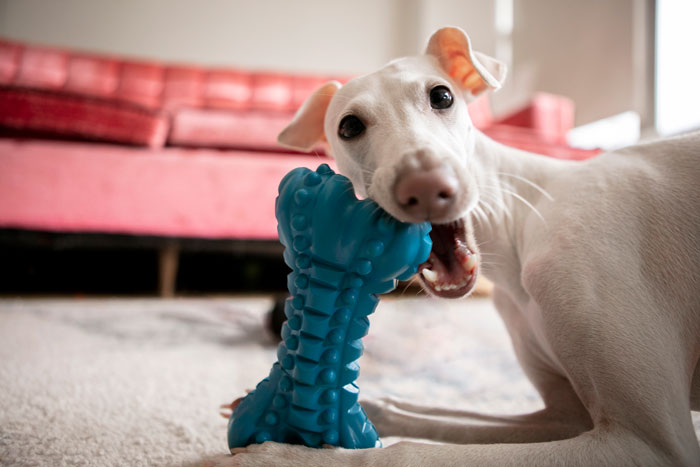
Dogs chew on toys for several instinctual and behavioral reasons.
Boredom and Lack of Stimulation
When your dog lacks enough exercise or playtime, they’ll start looking for ways to entertain themselves. According to astudy, dogs lose interest in toys due to habituation to the overall stimulus properties of the toy. This can lead to destructive behaviors like chewing and eating toys out ofsheer anxietyand pent-up energy.
Curiosity and Exploration
Young puppies use their mouths to learn about the world around them. Stuffed animals, with their different textures, sounds, and smells, are especially tempting for curious pups to explore and chew on.
Teething Discomfort
Just like human babies, puppies experience sore gums when their adult teeth come in. They may chew on toys to relieve the pressure and discomfort ofteething.
Underlying Medical Reasons
Is It Bad For Dogs To Eat Toys?
Image credits:
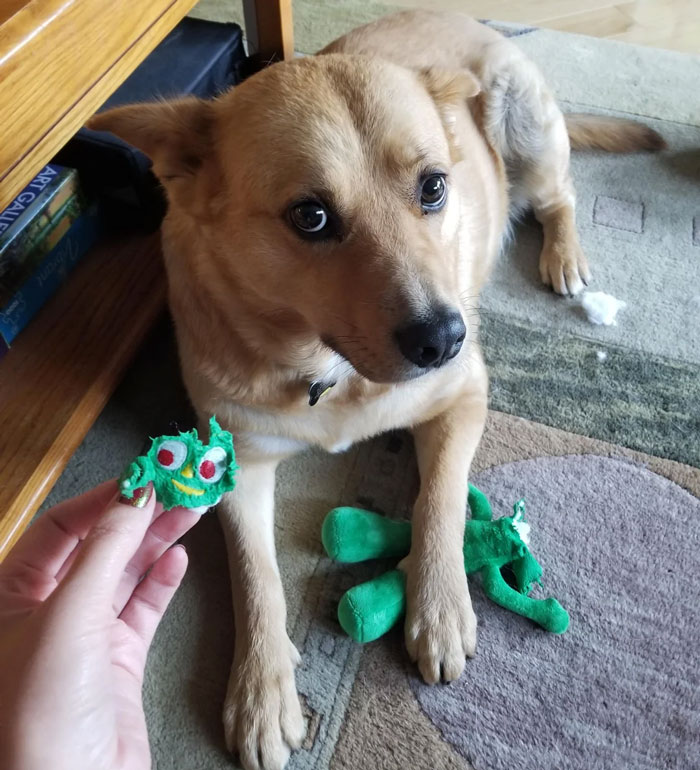
Yes, dogs eating toys can absolutely be harmful and sometimes even life-threatening. Here are the potential dangers:
Choking Hazards
Toy pieces, particularly those from squeaky toys or stuffed animals, can easily lodge in your dog’s throat, creating a choking hazard. This is an emergency situation requiring immediate veterinary attention. If ingested piece has sharp edge, it can tear the digestive tract.
Intestinal Blockages
Swallowed toy parts may not always pass smoothly. They can clump together in the stomach or intestines, leading to a blockage or obstruction. This blockage can prevent food from moving through the digestive system, causing severe health problems and requiring surgery.
Ingestion of Toxins
Sadly, some toys are made with materials that could be toxic to your dog. Ingesting these toys can lead to poisoning, causing various health issues. According to astudy, toy and training devices made of plastics can leach endocrine-disrupting chemicals into pet dogs’ saliva, potentially affecting their health.
Signs That Your Dog Ate A Stuffed Toy (or Another Toy)
Image credits:julius.chow
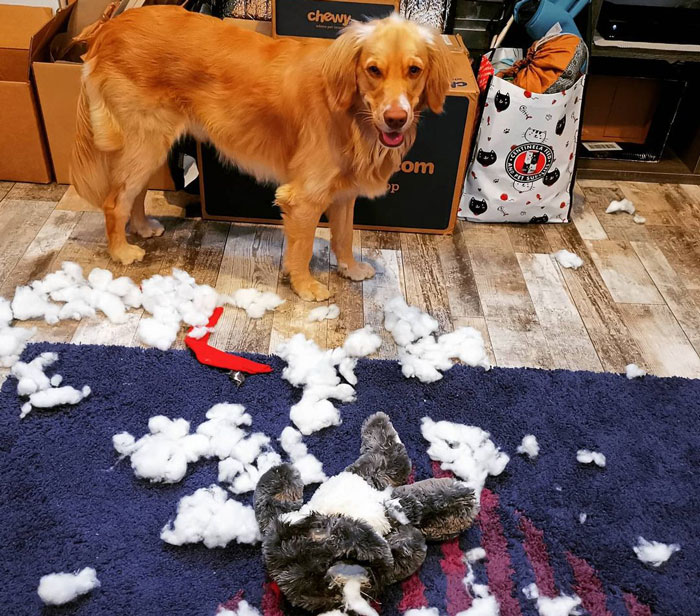
It’s crucial to be vigilant since dogs won’t always tell you directly if they’ve eaten something they shouldn’t. Here are the key signs to watch out for:
Important: If you suspect your dog has eaten a foreign object like toy, don’t try to induce vomiting at home. Contact your veterinarian immediately for guidance and instructions on how to proceed.
What to Do If Your Dog Ate a Toy
Image credits:alwaysajedi
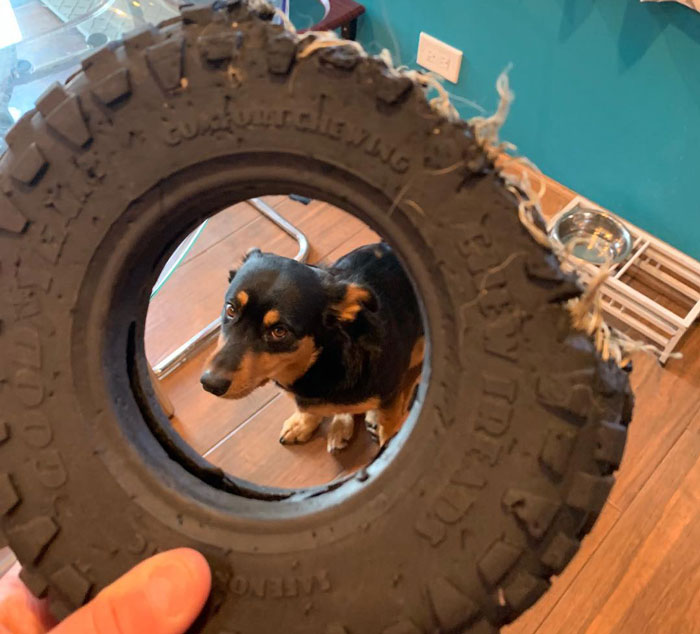
Discovering your dog has eaten a toy is stressful. Here’s how to handle the situation:
Preventing Your Dog From Eating Toys
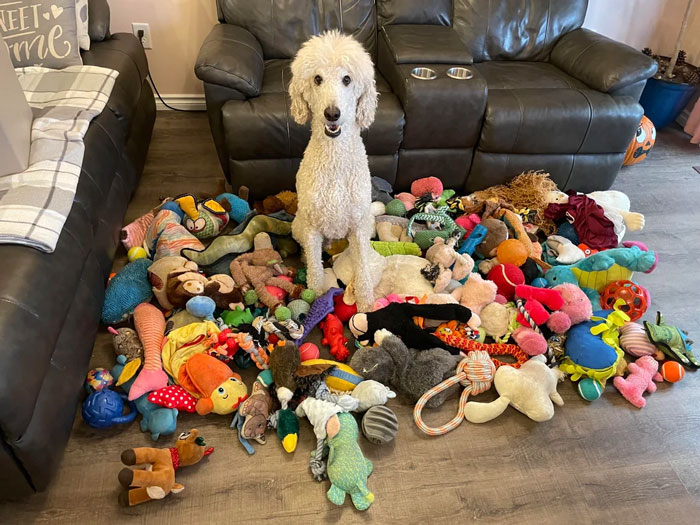
The best way to deal with toy destruction is to prevent it from happening in the first place. Here are some key strategies:
Additional Tips on Dogs Eating Toys
Want even more ways to curb destructive chewing? Try these additional tips:
Rotating toys:Swap out your dog’s toys regularly. This keeps things exciting, reducing boredom and the likelihood of focusing on destruction.
Bitter deterrents:Apply a pet-safe bitter spray (found at most pet stores) to toys to make them less appealing to chew.
Designated safe space(crate training):If your dog is prone to destructive chewing when unsupervised, a crate or a designated safe space can be helpful. Provide appropriate chew toys within this space.
Conclusion
Dogs eat toys for a variety of reasons – from boredom, exploration, and teething discomfort, to deeper medical concerns. Understanding the“why”is the first step towards finding the right solutions and keeping your furry friend safe. By providing appropriate toys, adequate stimulation, supervision, and training, you can redirect your dog’s chewing habits.
Remember, if you’re ever concerned about your dog’s destructive behavior or health, don’t hesitate to consult your veterinarian. They are your best partner in ensuring your dog’s well-being.
591views591views
Pet Wellness